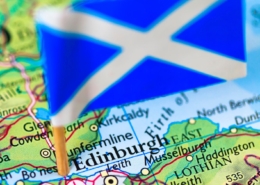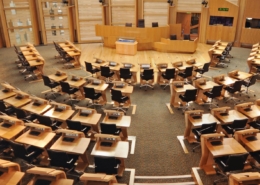Anti-UK separatists see legislative devolution as a path towards separation: What’s the point of devolution’s remit system?
Here we go again. SNP ‘Minister for External Affairs’ (NOTE: there are no ministers in a sub-national devolved assembly, only spokespersons) Angus Robertson has demanded that he be given more powers to impact trade in both Scotland and England by scrapping the Internal Market Act. Previously, SNP leader John Swinney let the cat out of the bag on how his party and other anti-UK separatists really view legislative devolution (Holyrood, the Welsh ‘Parliament’ and Stormont in Ulster). He demanded that the UK Government provide a ‘mechanism’ that would automatically trigger a referendum on separating Scotland from the rest of the UK, as exists with the Ulster (‘Northern Ireland’) legislative devolution set up.
These two incidents tell you all you need to know about the separatists and their attitude towards the current legislative devolution constitutional arrangements. They see it as merely a path towards their agenda of breaking up the UK. They won’t try to make it work and it’s pointless assuming they ever will. Consequently, Blair’s whole legislative devolutionary settlement is pointless as the SNP are never going to accept the ‘settlement’ and will just keep trying to manipulate it in a pathological, monomaniacal way as a tool to progress their separation agenda.
The same is true in Ulster, where Irish separatists IRA/Sinn Fein have obtained the First Minister position and used the vastly enhanced ability this position gifts them to push for separation referenda.
The situation isn’t as bad in Wales, but Welsh separatists Plaid Cymru have become increasingly bellicose in their demands for separation referenda, encouraged by the activities of the anti-UK separatists in the other devolved parts of the UK, especially the SNP in a clear illustration of the poisonous, corrosive knock-on domino effect of legislative devolution.
At its inception, nearly three decades ago, legislative devolution’s architects set up a system of remits that were supposed to strictly control the areas of policy the devolved executives could exercise responsibility over. In Scotland, the Scotland Act of 1998 laid out precisely that Westminster reserved certain policy areas for its sole consideration and Holyrood had no competency to pass laws or debate them (the reserved remit).
All other policy areas could be debated and legislated on by Holyrood (the devolved remit). The legislative devolutionary settlement in Ulster is characterised by a unique system where administrative powers are divided into three categories: reserved, excepted, and transferred. Transferred powers are controlled by the Northern Ireland Assembly, while reserved and excepted powers remain within the remit of the UK government. In Wales, the Conferred Powers Model of devolution, which limited the devolved legislature’s competence to powers specifically granted to it in statute was replaced by the Reserved Powers Model in 2017, which allowed the Welsh ‘parliament’ to pass laws on any matter not reserved for Westminster (just as in Scotland). Thus, there was a system of remits that laid out in black and white which areas of policy the executives of the devolved parts of the Union could debate and legislate on and that was supposed to make it ‘impossible’ for anti-UK separatism (the SNP in Scotland, IRA/Sinn Fein plus the SDLP in Ulster and Plaid Cymru in Wales) to break up the UK. In this way, legislative devolution’s advocates insisted that the UK was safe from separatism, as Westminster controlled power over the Constitution and so separatists in the devolved executives had no ability to force referenda on separating their part of the UK from the rest of the country. That was the grand theory, anyway.
This is not what’s happened in practice though. In Scotland, at least since the SNP displaced Labour as the dominant power at Holyrood in 2007, we’ve witnessed a constant interference by the separatists in reserved matters that they have no business even talking about, far less passing legislation on. There has been a constant stream of Holyrood debating and even passing legislation on reserved matters like ’independence’ (which comes under the reserved ‘Constitution’ heading) and Brexit (which comes under the ‘international trade/ relations’ heading, another reserved matter).
So, why is Holyrood even debating ‘independence’, far less passing bills concerning it and pressing for referenda on it? Added to this, why is the UK Government not enforcing the remit system? Why does it allow the anti-UK separatists to abuse the remit system to such a monumental degree? It’s irrelevant that separation is the raison d’être of the SNP (or IRA/Sinn Fein and the SDLP’s or Plaid). They simply have no business getting involved in reserved matters.
The legislative devolutionary remit system set up by Blair just isn’t working. Separatism, especially, but not exclusively, the SNP just ignores it and uses devolution as a tool to advance its independence obsession. This is undeniable, as we’ve seen a constant stream of debates about ‘independence’, bills have been passed about it at Holyrood and there has even been a referendum on it forced into happening by the SNP. How can this be stopped? The SNP are monomaniacal in their pursuit of separating Scotland from the rest of the UK. They are never going to give up on it. Just voting them out of office won’t cure the problem as they can just regain office at a later date and begin their pursuit of separation all over again. As long as Holyrood exists, this is always going to be a potential problem. It’s only legislative devolution that has enabled anti-UK separatism to rise to power and pursue separation with greatly enhanced ability. It’s time to stop pretending this isn’t happening, take our heads out of the sand, and solve the problem by the only viable way it’s possible to do so -abolish Holyrood and the Ulster and Welsh devolved legislatures.
(Does not represent the view of Scotland Matters)






